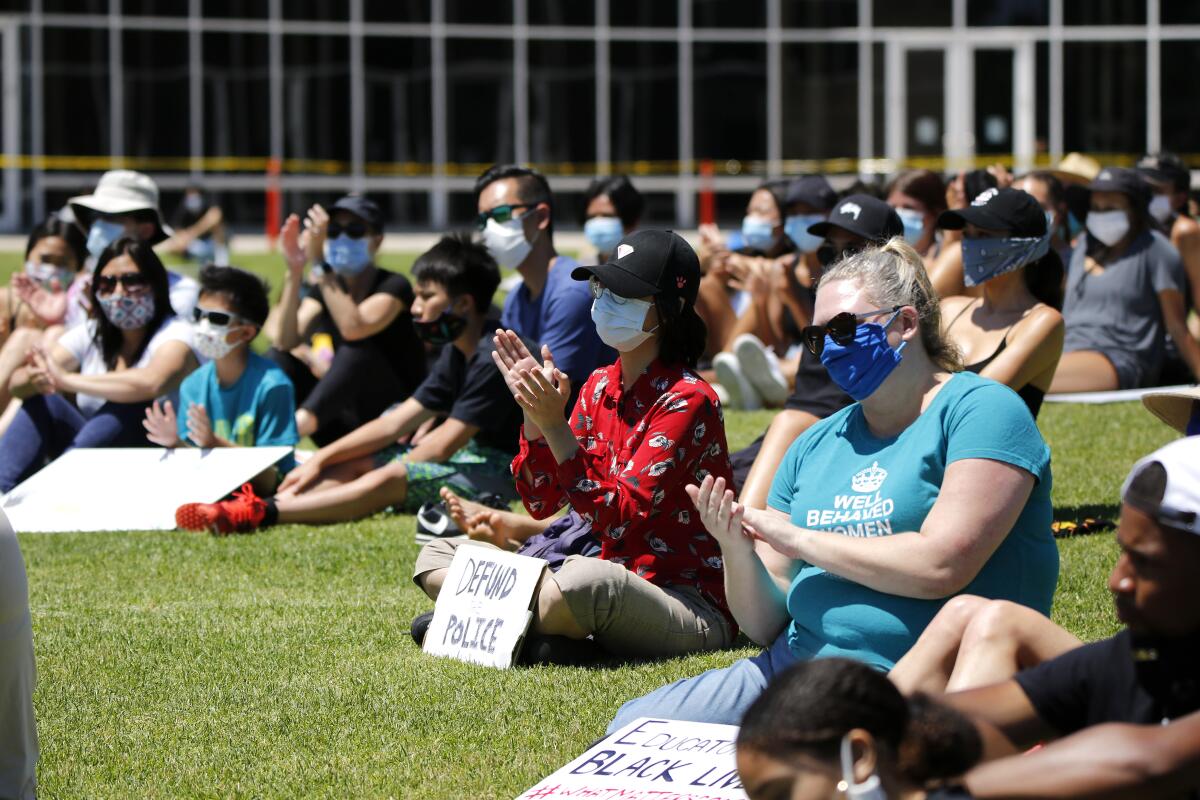Commentary: A mask in the O.C. has become as heated as the veil in Iran
- Share via
Walking down the sidewalk of my quiet university neighborhood in Irvine, a neighbor suddenly walks toward me.
I grab at the sides of the face mask dangling around my neck and pull it up as quickly as I can.
The tiny movement triggers a visceral reminder of hiking in Iran with my veil loosely wound around my neck and then pulling it up quickly to cover my hair the minute another hiker comes into view.
In both instances, there is a sense of urgency and danger. In Iran, the danger is that the friendly-looking hiker could be undercover morals police.
As I walk along an O.C. sidewalk during a pandemic, the danger is catching or spreading the novel coronavirus.
But here, I’ve had unmasked people either laugh at me — or worse, walk right up to me, getting in my face as an act of anti-mask aggression. All I can think about is just how much this present moment in the United States has in common with Iran.
As a young female anthropologist doing research in Iran, I had a lot of questions about what was curtailing my personal freedom, versus what was simply the visual force of political power.
Seeing is believing. Symbols, especially clothing, easily become hallmarks of a political stance, because they are so easily embodied by the citizens.
We see this now in the faces of protesters who use their masks to say what they want to scream — safely and responsibly. And herein lies the power of a piece of cloth; whether it’s a mask or a hijab, it’s how and where you wear it — and why.
Unveiling in Iran is considered anti-government, whereas in California, not wearing a mask can be considered anti-governor and pro-Trump (who has himself refused to wear a face mask in public).
It’s become such a heated topic in Orange County that the health commissioner Dr. Nichole Quick, having endured threats and backlash to her mask ordinance, an attempt to protect people, recently resigned from her job.
Last week, Orange County rescinded the mandatory mask mandate, though masks are still strongly recommended, and local groups continue to clash over the mask requirements.
On Thursday, Gov. Newsom issued a mandatory mask order, requiring all Californians to wear masks in public or in high-risk settings.
As I write about the commonalities of material culture, it’s hard not to comment on the culture of violence by the state against citizens in both places.
Is police brutality in the United States any different from any other violent regime?

A mask means I can walk where I want to and know that I have a protective barrier if I suddenly come upon a friend I want to talk to, or a crowd of often-unmasked, fearless teens whizzing by on bikes.
I also have a barrier between an older person who is at risk of serious complications or a bully who brazenly gets in my face to make a statement.
But it also sends a signal to all the frontline workers that I support them and their right not to get sick saving us. And masks allow people to rally and chant more safely.
At the end of the day, the mask doesn’t represent a lack of choice, but a good one. It’s been recommended by public health experts for personal safety and not for political or religious reasons.
It’s more than a symbol. Bound by politics and danger — and what we anthropologists call a social contract — what we wear is not immaterial. Sometimes it’s more than a political statement, it’s a matter of life and death.
Roxanne Varzi is the author of the award-winning “Last Scene Underground: An Ethnographic Novel of Iran (Stanford).” An artist, filmmaker, playwright and UC Irvine professor of anthropology, she held the first Fulbright to Iran since the revolution and was the youngest distinguished senior Iranian visiting fellow at St. Antony’s College, Oxford University.
All the latest on Orange County from Orange County.
Get our free TimesOC newsletter.
You may occasionally receive promotional content from the Daily Pilot.





